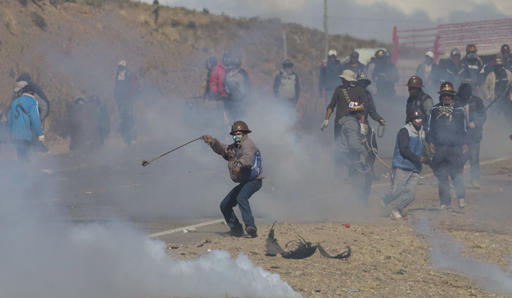
Independent miners clash with the police as they run from clouds of tear gas during protests in Panduro, Bolivia, Thursday, Aug. 25, 2016. Thousands of independent miners continued their protests with roadblocks which precipitated the clashes as the police attempted to dislodge them. AP Photo
LA PAZ, Bolivia—Bolivia’s Deputy Interior Minister Rodolfo Illanes was kidnapped by miners demanding labor law changes, the government said Thursday (Friday, Manila time), with some unconfirmed reports in local media saying he had been killed.
Interior Minister Carlos Romero announced Thursday morning that miners had kidnapped Illanes, who later told local media by telephone that “I am in very good health… safeguarded by peers, so people do not hurt me.”
But unconfirmed reports later said the government official was dead, citing a radio station director who said he saw Illanes’s body.
“We saw the lifeless body of deputy minister Illanes,” Moises Flores, director of a mining radio station, told another local radio outlet.
Attorney General Ramiro Guerrero told journalists that “at this time, we have not confirmed the situation of the official, if he is still kidnapped alive or if there has been a possible death.”
Miner demonstrations turned violent this week after a highway was blockaded, with protestors demanding mining concessions and the right to work for private or foreign companies.
Two workers died on Wednesday, according to the country’s national federation of miners, but the government has only recognized one death.
After days of clashes with police over control of the road, miners agreed with the government on Thursday to start negotiating Friday morning on the condition they open the route.
“The dialogue will start once the roads are clear,” Juan Ramon Quintana, minister of the presidency, told journalists.